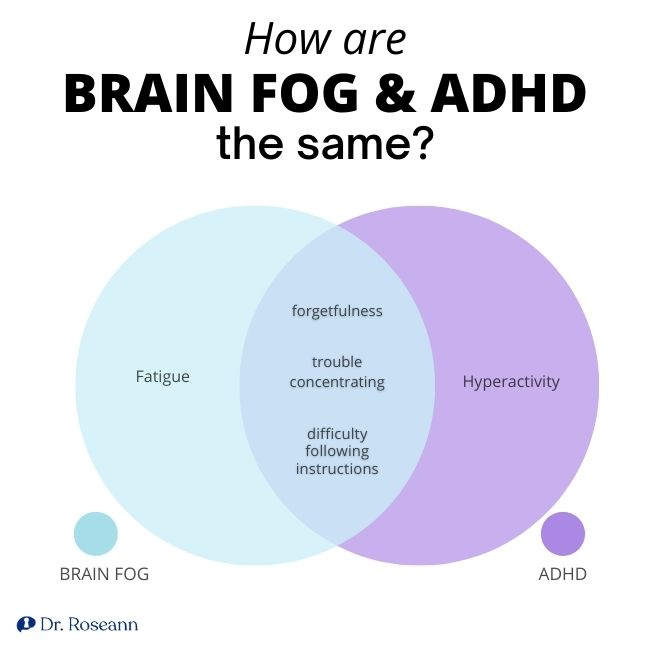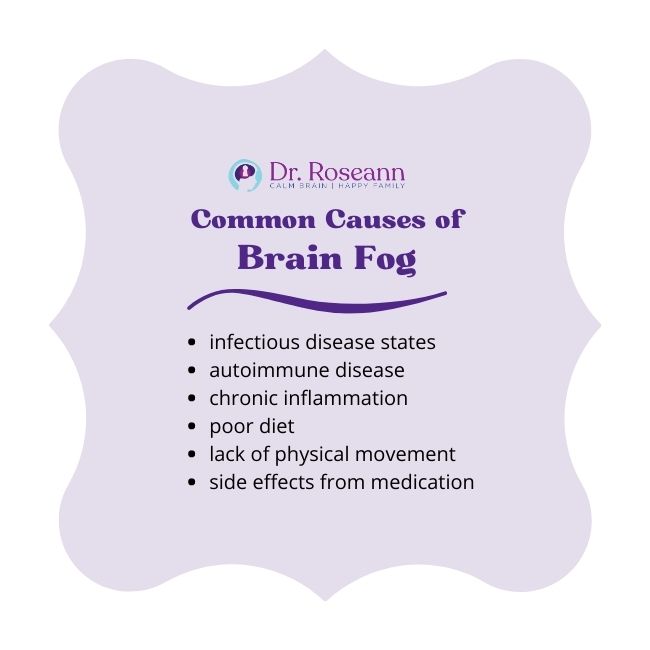Brain fog, a term used to describe sluggish thinking, confusion, forgetfulness, and a lack of focus, can occur when someone is sleep-deprived, unwell, or experiencing side effects from antihistamines and other medications that induce drowsiness.
On a cellular level, brain fog is believed to be caused by high levels of inflammation and changes to hormones that regulate mood, energy, and focus. Imbalanced hormone levels can throw the entire system off, potentially leading to obesity, abnormal menstruation, or diabetes mellitus.
Brain fog can result from autoimmune and infectious diseases, as well as toxic exposure to things such as chemicals, mold, and candida. One can feel quite unfocused, have low energy, and have difficulty thinking quickly.

The Difference Between Brain Fog and ADHD
Inattentive ADHD and brain fog share many symptoms, including forgetfulness, trouble concentrating, and difficulty following instructions. However, there are some critical differences between the two conditions. For example, brain fog is often associated with chronic fatigue syndrome, while inattentive ADHD does not usually cause fatigue.
The main difference is that brain fog typically results from an illness, medical condition, or infectious or toxic exposure, whereas ADHD is a clinical neurodevelopmental issue.
Attention Deficit Hyperactivity Disorder (ADHD) is a brain development disorder that can occur during childhood and sometimes into adulthood. The symptoms of ADHD can differ as a person ages.
Is it ADHD or something else?
Health experts at the Centers for Disease Control and Prevention (CDC) say there are three main types of ADHD:
- Hyperactive-impulsive can manifest as a constant need for activity, motion, and excessive talking.
- Inattentive can present itself in the form of difficulty focusing, staying on task, and retaining information.
- Combination presents with both high activity and cognitive symptoms.

What are the most common causes of brain fog?
The most common causes of brain fog are infectious disease states, autoimmune disease, chronic inflammation, poor diet, and lack of physical movement. The side effect of cancer treatments, like multiple sclerosis, also causes brain fog or, in this case, chemo brain.
Brain fog is that “tough to chase down” combination of feelings, being unfocused and tired for some unknown reason. It's common for one’s memory, word retrieval, and thinking are common.
It can occur with the onset or lingering effects of an underlying health condition or medication usage.
Brain Fog Remedy
Hydration and an anti-inflammatory and nutrient-rich diet combat brain fog symptoms. An anti-inflammatory diet reduces inflammation, while good nutrition signals the body to turn on its healing process.
Cardio-based exercise or physical activity that increases blood flow to the frontal lobes can help alleviate symptoms. Lack of sleep also contributes to brain fog, so be sure you get plenty.
Neurofeedback can restore one’s alertness and improve cognitive tempo. It is especially useful in improving brain cell communication to speed thinking and memory.
Lyme Disease and Brain Fog
In some cases, Lyme Disease can cause brain fog, including lack of focus, memory problems, confusion, difficulty forming words and thoughts, and personality changes. These symptoms can be subtle as they develop late in the disease. Moreover, brain fog can be a lingering symptom that remains long after the infection(s) have been treated.
Long COVID Hauler’s Brain Fog
Brain fog and other long COVID symptoms can last more than a year. With the recent pandemic, there has been a surge in COVID-related brain fog.
There is still much unknown about brain fog after COVID-19, but we do know that it can affect cognition in different ways. In many cases, brain fog is temporary and will eventually improve. However, we don't yet fully understand why brain fog occurs after COVID-19 or how long these symptoms might last. But, we do know that this form of brain fog can affect different aspects of cognition.
What is Cognition?
The human brain is an amazing thing. It allows us to think, learn, and remember information. This is cognition.
However, sometimes, our cognitive abilities can be impaired. Cognitive impairment is a reduced ability to perform at least one thinking skill. This can happen for various reasons, ranging from health problems to simply getting older.
People experiencing long COVID may have noticeable attention, memory, and executive function problems.
- Attention – allows our brains to actively process information about our object of focus while ignoring other details. Attention is like a spotlight on a stage during a show that enables performers to stand out from the background.
- Memory – the ability to learn, store, retain, and later retrieve information.
- Executive Function – includes life skills such as planning, focusing attention, responding to instructions, and multi-tasking.
Less obvious lapses in memory and attention may occur even with mild COVID. These symptoms can last days, weeks or months.
How do Mental Health Conditions Affect Cognitive Function?
It can be challenging to think clearly if we feel stuck emotionally, behaviorally, or socially. We may start to dwell on negative thoughts, and staying focused on a present task can be challenging. Cognitive decline, avoiding social activities, and short-term memory issues are common.
From a neuroscience perspective, the frontal lobes go offline when people experience high-stress levels, making it difficult to process information accurately. Pay attention to stress and other symptoms to prevent brain fog.
Do Some Medications for Mental Health Conditions Cause Brain fog? What are some ways to mitigate those side effects?
All psychiatric medications have prevalent adverse effects on the brain and body. It is always a question of whether the benefits far outweigh the risks.
When individuals on medication complain about side effects, adding another layer of medicines to temper them is typical.
That is why I explore integrative mental wellness and research natural ways to address mental health and related ailments. There are many research studies to substantiate the efficacy of natural treatments for mental health issues.
Nutrition, exercise, sleep, neurofeedback, and biofeedback are all evidence-based approaches that address brain fog and other mental health conditions. These therapies and methods should be explored when treating brain fog.
What Role do Diet and Lifestyle Play in Mental Health?
Our lifestyle, stress management strategies, and nutrient-intake directly impact our brain health.
A healthy diet and lifestyle changes should be considered primary strategies to address anxiety, depression, and attention problems.
Supplementing magnesium, vitamin B12, folate, and vitamin D can combat common nutrient deficiencies that impact mental health.
Assessing nutrient levels and supplementing are effective and safe ways to reduce mental health symptoms.
Positive changes in diet and lifestyle can also reduce inflammation in the brain and body, which positively affects mental health symptoms such as brain fog, attention, anxiety, and depression.
Chronic inflammation can persist for long periods in your body and have a lasting impact on your health. With today’s stressors and high levels of toxic exposure, it is easy to have inflammation. Inflammation can become a low-level chronic irritant to the system, leading to pain, discomfort, and clinical issues. It also can lead to a disruption of the gut biome.
The gut-brain connection is strong, meaning our gut health can affect our brain and body and by tending to our microbiome, we can improve mental health.
Keeping chronic inflammation in check is essential to maintain good overall health and can really go a long way to improving the gut-brain connection and brain functioning.
Parent Action Steps:
☐ Identify symptoms of brain fog and take note of any mental fogginess, forgetfulness, or lack of focus.
☐ Assess triggers and determine potential causes, such as stress, lack of sleep, or dietary habits
☐ Consult with a healthcare provider or specialist for a comprehensive evaluation
☐ Implement lifestyle changes to improve diet, exercise, sleep patterns, and stress management
☐ Explore the connection between brain fog, ADHD, and anxiety and seek appropriate support.
☐ Adopt brain-boosting practices like mindfulness, cognitive exercises, and brain-training activities
☐ Answer this quiz to find out why your kid can’t focus, listen, or complete tasks.
☐ Take our Solution Matcher and get personalized treatments for your child.
Citations:
Bangkok Hospital (2022), What is Brain Fog Syndrome?
https://www.bangkokhospital.com/en/content/brain-fog-syndrome
Harvard Health (2022), Brain fog: Memory and attention after COVID-19
https://www.health.harvard.edu/blog/brain-fog-memory-and-attention-after-covid-19-202203172707
Always remember… “Calm Brain, Happy Family™”
Disclaimer: This article is not intended to give health advice and it is recommended to consult with a physician before beginning any new wellness regime. *The effectiveness of diagnosis and treatment vary by patient and condition. Dr. Roseann Capanna-Hodge, LLC does not guarantee certain results.
Are you looking for SOLUTIONS for your struggling child or teen?
Dr. Roseann and her team are all about science-backed solutions, so you are in the right place!
Know more about the first of its kind supplement line is formulated by Dr. Roseann herself to effectively address mental health concerns.
Empower yourself with natural solutions for your child's mental health and behavior. Download our FREE quick start guide and start supporting your child today.
You can get her books for parents and professionals, including: It’s Gonna Be OK™: Proven Ways to Improve Your Child’s Mental Health, Teletherapy Toolkit™ and Brain Under Attack: A Resource For Parents and Caregivers of Children With PANS, PANDAS, and Autoimmune Encephalopathy.
If you are a business or organization that needs proactive guidance to support employee mental health or an organization looking for a brand representative, check out Dr. Roseann’s professional speaking page to see how we can work together.
Dr. Roseann is a Children’s Mental Health Expert and Therapist who has been featured in/on hundreds of media outlets including, CBS, NBC, FOX News, PIX11 NYC, The New York Times, The Washington Post, Business Insider, USA Today, CNET, Marth Stewart, and PARENTS. FORBES called her, “A thought leader in children’s mental health.”

She is the founder and director of The Global Institute of Children’s Mental Health and Dr. Roseann Capanna-Hodge, LLC. Dr. Roseann is a Board Certified Neurofeedback (BCN) Practitioner, a Board Member of the Northeast Region Biofeedback Society (NRBS), Certified Integrative Mental Health Professional (CIMHP) and an Amen Clinic Certified Brain Health Coach. She is also a member of The International Lyme Disease and Associated Disease Society (ILADS), The American Psychological Association (APA), Anxiety and Depression Association of America (ADAA) National Association of School Psychologists (NASP), International OCD Foundation (IOCDF) International Society for Neurofeedback and Research (ISNR) and The Association of Applied Psychophysiology and Biofeedback (AAPB).
© Roseann-Capanna-Hodge, LLC 2023










